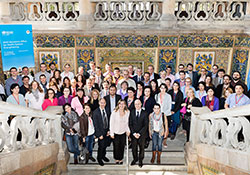Demand for the WHO Barcelona course on health financing continues to increase

WHO
Now in its seventh year, the annual WHO Barcelona Course on Health Financing for Universal Health Coverage, held in March 2017, was more heavily oversubscribed than ever before. With three applicants for every place, the course is an important fixture for health policy-makers in Europe. This year the 66 participants from 25 countries included senior officials from health and finance ministries, health insurance funds, major international institutions, universities and nongovernmental organizations.
About the course
The course combines systematic thinking about health systems and health financing with an interactive, practical focus on ways of improving health system performance through better policy analysis, design and implementation.
Participants draw on theory and international experience to diagnose health financing problems in a country of their choice and work together to overcome obstacles to moving towards universal health coverage.
Feedback from participants
Iryna Shevchenko, Special Projects Manager at the Ministry of Health in Ukraine, said “Even if one had no idea what health-care financing is about, at this WHO course one had for sure received a very comprehensive basic knowledge. For more proficient listeners it was a pleasure to hear objective and versatile views on payment instruments and voluntary health insurance ... The lecturers have included plenty of useful practical tips and artfully carved conclusions. Bravo to the authors and lecturers, I am amazed at what they have done in a one week course”.
“The subject of this course is very relevant. It is also great to have the reading material which you can use not only before the course but also to use as a reference afterwards. Strategic purchasing was the most interesting topic for me,” said Stefan Eichwalder, Deputy Head of Unit at the Federal Ministry of Health in Austria.
Kalliopi Vourliotou, Head of the Strategic Planning Division at the Ministry of Health in Greece, said “I was very happy to attend this course ... I received many ideas on how to manage solutions for patients and for ministers. We know now the most efficient steps to follow in order to achieve our goals. The most interesting topic for me was out-of-pocket payment because – unfortunately – we have a big problem with that in Greece. And I was also very interested in the session on private insurance and its role in universal health coverage”.
“The best thing about the course is that it is based not only on theory, but also covers practical experience. The format of the course is also very unique. There were so many countries represented and it was useful to share our experience with different specialists ... I will apply this good experience and the information I received during the course to go ahead with our reforms in the health-care system,” said Zhazguk Kiiizbaeva, State Secretary of the Ministry of Health of the Kyrgyz Republic.
Karlis Ketners, State Secretary of the Latvian Ministry of Health, said “This course is very useful for policy-makers and experts since it gives a full picture on universal health coverage and related financing policy matters. The WHO Barcelona office is really brilliant in providing the main points in a very short time, presenting insights on … tools for strategic purchasing, revenue collection, pooling of funds. I could also discuss some of the current challenges of the Latvian system with the WHO team as we are in the middle of reforming our financing model”.
Miriam Gutierrez, Expert for Medicinal Products at the European Commission, said “The course is so well organized and so clever in design: in the morning we had some theoretical knowledge and in the afternoon we applied it in the context of our working group cases. In addition to the useful information on international experience, the course provided tools and strategies to solve the very specific problems of each country. The same tools can be applied to different scenarios and it makes you think out of the box”.
“The materials and the lectures were very well prepared. We learned that there is no ideal solution for everyone: all policy options have pros and cons that we must consider depending on the actual situation,” said Wojciech Niemczyk, Senior Specialist at the Polish Ministry of Health.



